教师参考用书新标准大学日1
幼儿园教师用书推荐汇总
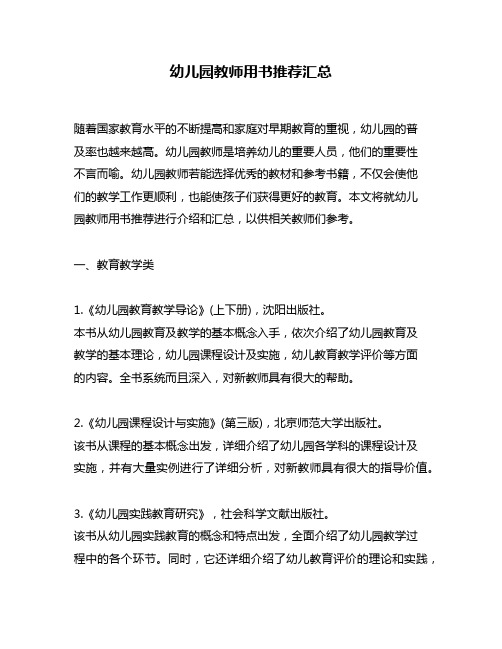
幼儿园教师用书推荐汇总随着国家教育水平的不断提高和家庭对早期教育的重视,幼儿园的普及率也越来越高。
幼儿园教师是培养幼儿的重要人员,他们的重要性不言而喻。
幼儿园教师若能选择优秀的教材和参考书籍,不仅会使他们的教学工作更顺利,也能使孩子们获得更好的教育。
本文将就幼儿园教师用书推荐进行介绍和汇总,以供相关教师们参考。
一、教育教学类1.《幼儿园教育教学导论》(上下册),沈阳出版社。
本书从幼儿园教育及教学的基本概念入手,依次介绍了幼儿园教育及教学的基本理论,幼儿园课程设计及实施,幼儿教育教学评价等方面的内容。
全书系统而且深入,对新教师具有很大的帮助。
2.《幼儿园课程设计与实施》(第三版),北京师范大学出版社。
该书从课程的基本概念出发,详细介绍了幼儿园各学科的课程设计及实施,并有大量实例进行了详细分析,对新教师具有很大的指导价值。
3.《幼儿园实践教育研究》,社会科学文献出版社。
该书从幼儿园实践教育的概念和特点出发,全面介绍了幼儿园教学过程中的各个环节。
同时,它还详细介绍了幼儿教育评价的理论和实践,并提出了许多实用的指导方法,对新教师具有很大的参考意义。
4.《幼儿教师职业技能标准与“宝贝教育”教学指南》,广东教育出版社。
本书以《幼儿教师职业技能标准》为依据,结合了幼儿园教师的实际情况,提出了“宝贝教育”理念,以此为基础设计了具有实操性的教学指南,可以帮助幼儿园教师掌握更全面的幼教知识。
二、儿童心理学类1.《幼儿心理学》,华中师范大学出版社。
该书全面介绍了幼儿心理学的相关知识,包括儿童认知、情感、人格等方面的内容。
同时,还有针对性的章节介绍了儿童教育工作中存在的心理问题及处理方法,具有实用性和参考价值。
2.《幼儿园教师的儿童心理学》,浙江人民出版社。
该书详细介绍了儿童的身心发展、性格心理、动机及情绪等心理问题,并对幼儿园教育的实践应用进行了深入分析。
除了从心理学角度了解幼儿外,同时该书还提供了多种有效的幼教案例,帮助教师获取实用性思路和方法。
新标准大学英语(第二版)综合教程 精读1 课后参考翻译
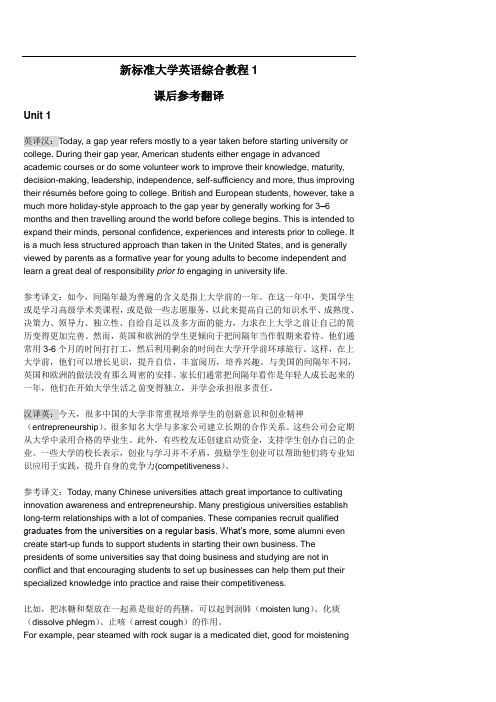
新标准大学英语综合教程1课后参考翻译Unit 1英译汉:T oday, a gap year refers mostly to a year taken before starting university or college. During their gap year, American students either engage in advanced academic courses or do some volunteer work to improve their knowledge, maturity, decision-making, leadership, independence, self-sufficiency and more, thus improving their résumés before going to college. British and European students, however, take a much more holiday-style approach to the gap year by generally working for 3–6 months and then travelling around the world before college begins. This is intended to expand their minds, personal confidence, experiences and interests prior to college. It is a much less structured approach than taken in the United States, and is generally viewed by parents as a formative year for young adults to become independent and learn a great deal of responsibility prior to engaging in university life.参考译文:如今,间隔年最为普遍的含义是指上大学前的一年。
新版标准日本语书第一册
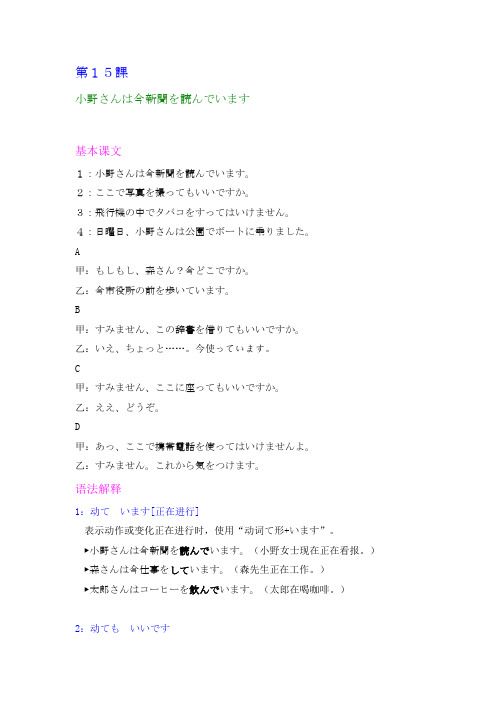
第15課小野さんは今新聞を読んでいます基本课文1:小野さんは今新聞を読んでいます。
2:ここで写真を撮ってもいいですか。
3:飛行機の中でタバコをすってはいけません。
4:日曜日、小野さんは公園でボートに乗りました。
A甲:もしもし、森さん?今どこですか。
乙:今市役所の前を歩いています。
B甲:すみません、この辞書を借りてもいいですか。
乙:いえ、ちょっと……。
今使っています。
C甲:すみません、ここに座ってもいいですか。
乙:ええ、どうぞ。
D甲:あっ、ここで携帯電話を使ってはいけませんよ。
乙:すみません。
これから気をつけます。
语法解释1:动ています[正在进行]表示动作或变化正在进行时,使用“动词て形+います”。
▶小野さんは今新聞を読んでいます。
(小野女士现在正在看报。
)▶森さんは今仕事をしています。
(森先生正在工作。
)▶太郎さんはコーヒーを飲んでいます。
(太郎在喝咖啡。
)2:动てもいいです表示许可时,使用“动词て形+いいです”▶家で仕事をしてもいいです。
(在家里工作也可以。
)▶ここで写真を撮ってもいいですか。
(这儿可以拍照吗?)————いいですよ。
(可以。
)▶家に帰ってもいいですか。
(可以回家吗?)————はい、帰ってもいいです。
(是的,可以回家。
)答句中的“はい、帰ってもいいです”常常简略说成“はい、いいです”。
表示说话人的许可时,使用“いいですよ”。
在句尾加“よ”可以使语气变得柔和。
这里的“よ”须读升调。
注意:这种表达方式一般不用于尊长,因为那样显得很傲慢。
3:动てはいけません表示禁止时,使用“动词て形+は+いけません”。
▶飛行機も中でタバコを吸ってはいけません。
(飞机上不能吸烟。
)▶教室でものを食べてはいけません。
(教室里不能吃东西。
)▶この部屋に入ってはいけませんか。
(不能进这个屋子吗?)————はい、入ってはいけません。
(是的,不能。
)————いいえ、入ってもいいです。
(不,可以进。
)注意:对尊长一般不用“~てはいけません”而使用“~ないでください”。
《大学日语1》教学大纲
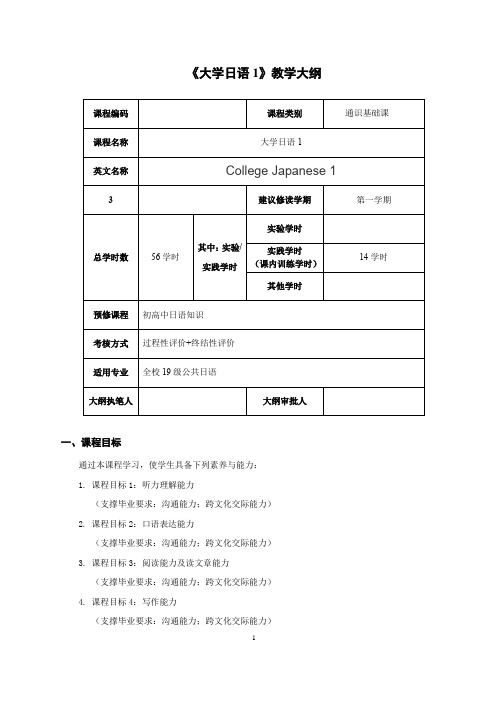
《大学日语1》教学大纲一、课程目标通过本课程学习,使学生具备下列素养与能力:1. 课程目标1:听力理解能力(支撑毕业要求:沟通能力;跨文化交际能力)2. 课程目标2:口语表达能力(支撑毕业要求:沟通能力;跨文化交际能力)3. 课程目标3:阅读能力及读文章能力(支撑毕业要求:沟通能力;跨文化交际能力)4. 课程目标4:写作能力(支撑毕业要求:沟通能力;跨文化交际能力)5. 课程目标5:翻译能力(支撑毕业要求:沟通能力;跨文化交际能力)二、课程目标与毕业要求的对应关系三、教学内容、重难点和课时安排四、课程教学方法课堂讲授、小组讨论、习题练习等。
五、课程教学评价方法总评成绩构成(100%)=出勤(10%)+课堂表现(10%)+作业(5%)+测试(5%)+期末考试(70%)注:分目标达成度计算方法为:分目标平均成绩/分目标总分*100%课程总体目标达成度计算方法为:学生平均成绩/总分*100%六、课程学习资源1.选用教材2.主要参考书目(1)《新大学日语阅读与写作1,2》教学参考书高等教育出版社(2)《新大学日语听力与会话1》教学参考书高等教育出版社(3)《新明解国语辞典》金田一京助世界图书出版社(4)《日语句型词典》徐一平(代表)外语教学与研究出版社(5)和风日语学习网站: /(6)沪江日语学习网站: /七、课程学习建议1. 充分有效做好复习与预习。
2. 主动阅读外文期刊,保证一定的阅读量,多练习听力。
3. 通过网络或电视了解日本人的习惯及语言表达,提高跨文化交际能力。
4. 善于分析和总结,温故而知新。
八、评分标准九、附表:教学进度安排。
教师专用:100本必读书目 表格版

《教育心理学》
16
《教育行政学》
17
《教学技能与方法》
18
《教育学原理》
19
《课堂评价与提高》
20
《教育社会学》
21
《教育学史》
22
《教育心理学教程》
23
《教育心理学导论》
24
《教育学基本原理》
25
《教育统计学》
26
《教育学科学研究方法》
27
《教育科学研究方法》
28
《教育科学学》
29
《教育科学基本原理》
90
《教育学研究与创新方法与设计方法原理》
91
《教育学研究与创新方法与策略方法原理》
92
《教育学研究与创新方法与实验设计方法原理》
93
《教育学研究与创新方法与探索设计方法原理》
94
《教育学研究与创新方法与发展设计方法原理》
95
《教育学研究与创新方法与设计实践原理》
96
《教育学研究与创新方法与策略实践原理》
56
《教育学研究与创新原理》
57
《教育学研究与创新导论》
58
《教育学研究与创新方法论》
59
《教育学研究与创新方法与技巧》
60
《教育学研究与创新方法与实践》
61
《教育学研究与创新方法与应用》
62
《教育学研究与创新方法与实验》
63
《教育学研究与创新方法与探索》
64
《教育学研究与创新方法与发展》
65
《教育学研究与创新方法与设计》
82
《教育学研究与创新方法与实验设计实践》
83
《教育学研究与创新方法与探索设计实践》
84
教师用书一览表

教师用书一览表
教师用书是教师们备课时的得力助手,能够提供丰富的教学资源和指导。
以下是一份教师用书一览表,列举了一些常用的教师用书,希望能给广大教师们提供一些参考。
一、教育理论与方法类
1.《教育心理学导论》:介绍教育心理学的基本理论和方法,帮助教师了解学生的心理发展规律,指导教学实践。
2.《教育学原理》:系统介绍教育学的基本理论和原理,帮助教师把握教育规律,提高教学质量。
3.《教学设计与评价》:介绍教学设计和评价的基本原则和方法,帮助教师设计合理的教学方案,并进行科学评价。
二、学科教学类
1.《语文教学指导与案例》:提供语文教学的指导原则和实例,帮助教师提高语文教学效果。
2.《数学教学指导与案例》:介绍数学教学的方法和案例,帮助教师培养学生的数学思维能力。
3.《英语教学指导与案例》:提供英语教学的指导和实例,帮助教师开展有效的英语教学活动。
三、教育管理与领导类
1.《教育管理学》:介绍教育管理的基本理论和方法,帮助教师提高
学校管理水平。
2.《教育领导与决策》:介绍教育领导的理论和实践,帮助教师提高领导能力,推动学校发展。
四、教育技术与信息化类
1.《教育技术学》:介绍教育技术的基本原理和应用,帮助教师合理运用教育技术手段,提高教学效果。
2.《信息技术与教育》:介绍信息技术在教育中的应用,帮助教师利用信息技术提升教学效果。
以上仅是一份简单的教师用书一览表,实际上教师用书种类繁多,可以根据自己的教学需要选择合适的教师用书。
希望广大教师们通过使用好教师用书,提高自己的教学水平,为学生的成长和发展贡献自己的力量。
第一批十二五国家级规划教材

高等教育出版社 高等教育出版社 高等教育出版社 高等教育出版社 高等教育出版社 高等教育出版社 高等教育出版社 高等教育出版社 高等教育出版社 高等教育出版社 高等教育出版社 高等教育出版社 高等教育出版社 高等教育出版社 高等教育出版社 高等教育出版社 外语教学与研究出版社 河南人民出版社 外语教学与研究出版社 浙江大学出版社 北京大学出版社 北京大学出版社 北京大学出版社 北京大学出版社 北京大学出版社 北京大学出版社 北京大学出版社 北京大学出版社 北京大学出版社 北京大学出版社 北京大学出版社 北京大学出版社 北京大学出版社 北京大学出版社
华东师范大学 华东师范大学 华东师范大学 东北大学 东北大学 东北大学 东北大学 东北大学 东北大学 东北大学 东北大学 东北大学 东北大学 东北大学 东北大学 华南理工大学 北京外国语大学 河南大学 浙江大学 宁波大学 北京大学 北京大学 北京大学 北京大学 北京大学 北京师范大学 北京大学 北京航空航天大学 北京大学 四川大学 西南财经大学 电子科技大学 安徽大学 淮北煤炭师范学院
35
36 37 38 39 40 41
英语听力教程 教师用书4(第二版) 英语听力教程 教师用书5(第二版) 英语听力教程 教师用书6(第二版) 新通用大学英语综合教程1 新通用大学英语综合教程2 新通用大学英语综合教程3 新通用大学英语综合教程4 新通用大学英语阅读教程1 新通用大学英语阅读教程2 新通用大学英语阅读教程3 新通用大学英语阅读教程4 新通用大学英语综合技能训练1 新通用大学英语综合技能训练2 新通用大学英语综合技能训练3 新通用大学英语综合技能训练4 文学导论 西方思想经典导读 英国文学简史(新增订本) 新编大学英语6 旅游英语 大学英语视听说教程(1)学生用书 大学英语视听说教程(2)学生用书 大学英语视听说教程(3)学生用书 大学英语视听说教程(4)学生用书 大学英语教程(1)学生用书(修订版) 大学英语教程(2)学生用书(修订版) 大学英语教程(3)学生用书(修订版) 大学英语教程(4)学生用书(修订版) 大学英语阅读教程(1) 大学英语阅读教程(2) 大学英语阅读教程(3) 大学英语阅读教程(4) 大学英语快速阅读(1)修订版 大学英语快速阅读(2)修订版
高校标准教案格式
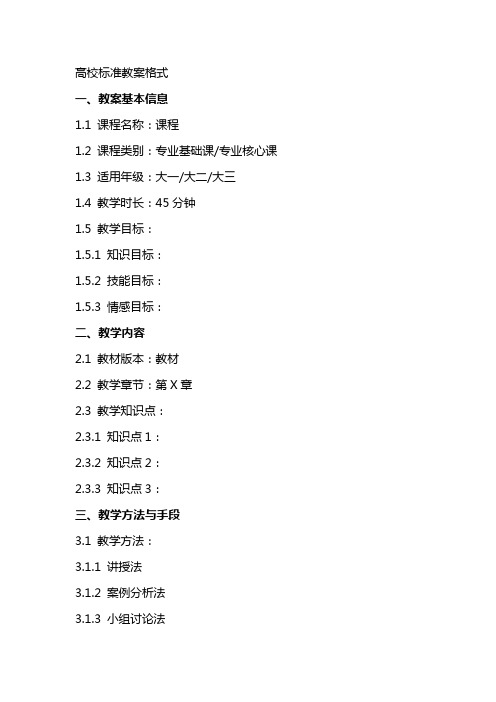
高校标准教案格式一、教案基本信息1.1 课程名称:课程1.2 课程类别:专业基础课/专业核心课1.3 适用年级:大一/大二/大三1.4 教学时长:45分钟1.5 教学目标:1.5.1 知识目标:1.5.2 技能目标:1.5.3 情感目标:二、教学内容2.1 教材版本:教材2.2 教学章节:第X章2.3 教学知识点:2.3.1 知识点1:2.3.2 知识点2:2.3.3 知识点3:三、教学方法与手段3.1 教学方法:3.1.1 讲授法3.1.2 案例分析法3.1.3 小组讨论法3.2 教学手段:3.2.1 投影仪3.2.2 计算机辅助教学3.2.3 教学课件四、教学过程设计4.1 导入环节:4.1.1 教学活动:4.1.2 学生活动:4.1.3 设计意图:4.2 知识讲解环节:4.2.1 教学活动:4.2.2 学生活动:4.2.3 设计意图:4.3 实践操作环节:4.3.1 教学活动:4.3.2 学生活动:4.3.3 设计意图:4.4 课堂小结环节:4.4.1 教学活动:4.4.2 学生活动:4.4.3 设计意图:4.5 作业布置环节:4.5.1 作业内容:4.5.2 作业要求:4.5.3 设计意图:五、教学反思5.1 教学效果评价:5.1.1 学生课堂参与度:5.1.2 学生作业完成情况:5.1.3 学生考试成绩:5.2 教学优点:5.3 教学不足:5.4 改进措施:六、教学评价6.1 评价方式:6.1.1 平时成绩(30%)6.1.2 课堂表现(30%)6.1.3 作业完成情况(20%)6.1.4 期末考试成绩(20%)六、教学评价6.1 评价方式:6.1.1 平时成绩(30%)6.1.2 课堂表现(30%)6.1.3 作业完成情况(20%)6.1.4 期末考试成绩(20%)六、教学评价6.1 评价方式:6.1.1 平时成绩(30%)6.1.2 课堂表现(30%)6.1.3 作业完成情况(20%)6.1.4 期末考试成绩(20%)六、教学评价6.1 评价方式:6.1.1 平时成绩(30%)6.1.2 课堂表现(30%)6.1.3 作业完成情况(20%)6.1.4 期末考试成绩(20%)六、教学评价6.1 评价方式:6.1.1 平时成绩(30%)6.1.2 课堂表现(30%)6.1.3 作业完成情况(20%)6.1.4 期末考试成绩(20%)七、教学资源7.1 教学资源名称:7.2 资源类型:教材、课件、网络资源等7.3 获取途径:学校资源库、网络等7.4 使用说明:八、教学拓展8.1 拓展内容:8.2 拓展方式:小组讨论、课外阅读等8.3 拓展目标:8.4 拓展时间:九、教学预案9.1 突发情况应对:9.2 课堂纪律管理:9.3 教学内容调整:9.4 教学方法调整:十、教学总结10.1 教学收获:10.2 教学反思:10.3 教学改进措施:10.4 教学心得:十一、课后作业11.1 作业内容:根据本节课所学内容,完成相应的练习题。
第一批“十二五”普通高等教育本科国家级规划教材书目
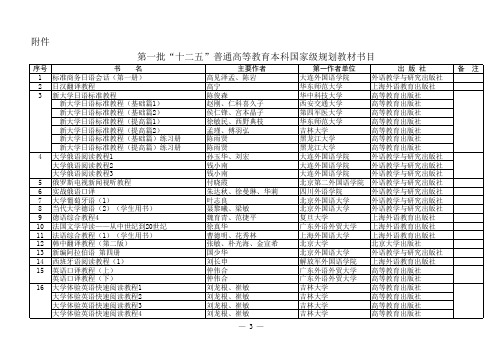
贾国栋
大学体验英语教学参考书3(第二版)
伍忠杰
大学体验英语教学参考书4(第二版)
余渭深
大学体验英语扩展教程1(第二版)
宁春岩
大学体验英语扩展教程2(第二版)
贾国栋
大学体验英语扩展教程3(第二版)
伍忠杰
大学体验英语扩展教程4(第二版)
余渭深
19 英语学位论文写作教程
黄国文、M.Ghadessy
20 基础英语写作
备注
序号
书名
主要作者
25 21世纪大学新英语视听说教程4
陈向京
21世纪大学新英语视听说教程教师参考书1 邵钦瑜
21世纪大学新英语视听说教程教师参考书2 陈向京
21世纪大学新英语视听说教程教师参考书3 李京平
21世纪大学新英语视听说教程教师参考书4 陈向京
21世纪大学新英语视听说基础教程
蒋学清
21世纪大学新英语视听说基础教程教师参考书 蒋学清
出版社 高等教育出版社 高等教育出版社 高等教育出版社 高等教育出版社 高等教育出版社 高等教育出版社 高等教育出版社 高等教育出版社 高等教育出版社 高等教育出版社 高等教育出版社 高等教育出版社 高等教育出版社 高等教育出版社 高等教育出版社 高等教育出版社 高等教育出版社 高等教育出版社 高等教育出版社 高等教育出版社 高等教育出版社 高等教育出版社 西安交通大学出版社 高等教育出版社 外语教学与研究出版社 北京大学出版社 北京大学出版社 复旦大学出版社 复旦大学出版社 复旦大学出版社 复旦大学出版社
黑玉琴
21 20世纪西方文学(第2版)
刘建军
22 语言学概论
蓝纯
23 二十世纪西方文论
朱刚
24 美国历史文化
大学教师必读书目100本

大学教师必读书目100本以下是大学教师必读的100本书目。
这些书籍横跨不同领域和学科,涵盖了教学、研究和个人成长等方面。
它们将为教师提供启发,帮助他们深入了解教育和学术界的最新趋势和理论。
教学理论与方法1. 《教学的艺术》- 约翰·鲍威尔2. 《教育心理学》- 约翰·D·布鲁纳和大卫·曼恩3. 《高效授课:二十八个研究证据支撑的策略》- 罗伯特·巴恩斯4. 《深度研究》- 约翰·汤普森5. 《改变研究:教师如何改变学生的成就和态度》- 约翰·希达专业发展与学术研究6. 《如何撰写学术论文》- 罗恩·艾利斯7. 《怎么写好论文》- 彼得·高斯8. 《大学教育研究方法》- 凯瑟琳·P·奥图9. 《大学教育领导力》- 彼得·加尔布雷斯10. 《大学教改:理论与实践》- 罗伯特·贝克和埃林·摩桑学科教学参考11. 《编程思维导论》- 彼得·吉图尔、梅琳达·纳尔逊12. 《现代有机化学》- 威廉·H·布朗等13. 《微积分原理与实践》- 理查德·哈姆14. 《外语教学方法与技巧》- 克莱门汀·布朗15. 《宇宙的演化》- 拉斯·弗利什教育心理学16. 《儿童发展心理学》- 拉里·D·罗森鲁姆等17. 《认知心理学导论》- 约翰·R·安德森18. 《心理学导论》- 约翰·W·谢克斯19. 《研究动机的心理学研究》- 珍妮·维汀顿等20. 《行为决策:透视个体差异的心理学研究》- 乔治·L·科弗曼教育技术与在线教育21. 《在线研究:教育技术和网络课程设计》- 丝塔芙尼·皮司科特等22. 《教育科技领导力》- 帕特里夏·库茨和拉里·E·克恩23. 《网络教育:教学评估与师资发展》- 林肯·朱士顿和哈洛德·狄伯顿24. 《计算机辅助研究》- 理查德·E·卡瑟因25. 《教育机器人:设计与应用》- 罗斯·克劳奇等教师与学生关系26. 《教师情感教育:建立学生与教师的亲和力》- 丹尼尔·戈尔曼和艾默生·恩斯27. 《学生心理健康与支持》- 彼得·K·史科特28. 《学生与学生关系:发展与实践》- 弗兰克·S·博雅等29. 《研究者多样性:教师迎接差异化的挑战》- 罗宾·M·普表30. 《青少年心理学》- 约翰·S·桑顿教育政策与社会问题31. 《公共政策与教育改革》- 布赖恩·E·布斯32. 《教育行政学》- 罗伯特·G·鲁肯33. 《学校暴力:实施与干预》- 玛丽·伊瑟尔曼34. 《青年就业与劳动力发展》- 马塞尔·奥维耶和卡伦·赖特35. 《教育平等:理论、政策和实践》- 史蒂芬·J·巴拉克特和丹尼斯·P·康纳利教育心理学36. 《儿童发展心理学》- 拉里·D·罗森鲁姆等37. 《认知心理学导论》- 约翰·R·安德森38. 《心理学导论》- 约翰·W·谢克斯39. 《研究动机的心理学研究》- 珍妮·维汀顿等40. 《行为决策:透视个体差异的心理学研究》- 乔治·L·科弗曼思辨与批判性思维41. 《批判性思维:拓展教师和学生的思考》- 理查德·42. 《解决问题的邀请:批判性思维的技巧和策略》- 斯蒂芬·布朗和马克·弗古索43. 《逻辑与批判性思维》- 加里·托克曼等44. 《判断与批判性思维》- 美国心理学会45. 《批判性思维的教育:实施和评估》- 琳达·艾尔克根等教育法律与伦理46. 《教育法》- 戴维·罗森菲尔德47. 《教育法律与伦理》- 约翰·E·蓝宁等48. 《教师伦理实用指南》- 乔·托克巴斯49. 《教育伦理学:理论和实践》- 罗伯特·R·玛林50. 《专业伦理:职业行为的指南》- 康拉德·C·戴文波特和伦纳德·J·布鲁纳教师自我成长与心理健康51. 《教师自我反思:提高教育质量》- 戴维·贝克等52. 《心理健康指南:培养教师的幸福和满意度》- 卡罗尔·费舍尔53. 《心理学、健康与幸福》- 泰勒·汤普森54. 《工作生活平衡:如何在压力下保持人生的和谐》- 彼得·琼斯55. 《成功的人生:提高人生质量的策略》- 西恩·库克跨文化教育56. 《教育学跨文化研究》- 战同协57. 《国际教育:理论与实践》- 琳达·丰塔内拉58. 《教育的全球发展:理论、实践和策略》- 安德鲁·P·纳尼59. 《国际教育政策与管理》- Lori Diane Hill60. 《跨文化教育导论》- 迈克尔·耶茨和彼特·卢卡斯教育心态与情绪管理61. 《教师心态:塑造教育的态度和信念》- 卡罗琳·D·迪维尔比62. 《积极心态:运用心理学的力量改变你的教育和生活》- 卡洛琳·S·德鲁莱特63. 《情绪智力:为什么情绪比智力更重要》- 丹尼尔·戈尔曼64. 《情绪劳动:办公室情绪管理的研究》- 阿琳·克劳福德等65. 《心理学的魅力:积极情感的力量》- 马修·P·沃诺奇斯教育心理学66. 《儿童发展心理学》- 拉里·D·罗森鲁姆等67. 《认知心理学导论》- 约翰·R·安德森68. 《心理学导论》- 约翰·W·谢克斯69. 《研究动机的心理学研究》- 珍妮·维汀顿等70. 《行为决策:透视个体差异的心理学研究》- 乔治·L·科弗曼文学与写作71. 《学术写作与文书写作》- 理查德·瓦尔波、罗宾·科瑟利特72. 《文学是什么》- 特里斯坦·波卡73. 《写作与修辞:修辞的经典与现在》- 克里斯托弗·布坎南74. 《读写技巧指南》- 康拉德·库宁厄姆75. 《文化批判与理论写作》- 夫·舍尔维奇知识管理与信息素养76. 《知识管理》- 彼得·德鲁克77. 《信息素养与学术研究》- 凯文·辛顿78. 《信息组织与检索》- G·G·查特、琳德·格兰特、哈里·布鲁·怀特79. 《视觉信息处理与研究》- 约翰·鲍威尔等80. 《网络信息素养:发展现代技术和知识管理能力》- 琳达·伯克利高等教育研究81. 《大学教育学:理论与实践》- 大卫·默里奥特82. 《高等教育发展:可持续增长的策略》- 瑞克·爱德华兹83. 《高等教育管理研究》- ·贝丁顿、理查德·鲁宾斯等84. 《高等教育经济学》- 威廉·E·贝利85. 《大学管理与领导研究》- 彼得·吉尔克里斯特等当代教育问题86. 《教育全球化:理论、政策和实践》- 弗雷迪·B·贺斯特曼等87. 《基于社区的学校:建立学校与社区的合作关系》- 辛西娅·E·科勒88. 《多元文化教育:国际观察和研究》- James A. Banks89. 《教育的未来:教育技术与机会平等》- 约翰·K·阿尼鲍尔德90. 《教育与环境可持续性》- 丹妮尔·弗莱明教育领导与管理91. 《教育理论与实践》- 琳赛·马丁92. 《教育管理学》- 大卫·米勒93. 《教育领导学:理论、研究与应用》- 弗雷德·C·韦德94. 《教育改革:理论与实践》- 罗伯特·斯林格尔、杰夫·斯塔切尔95. 《教育改革与变化管理》- 约翰·彼得凯隆和贝蒂尔·奈尔逊。
新标准大学英语(第二版)教学大纲
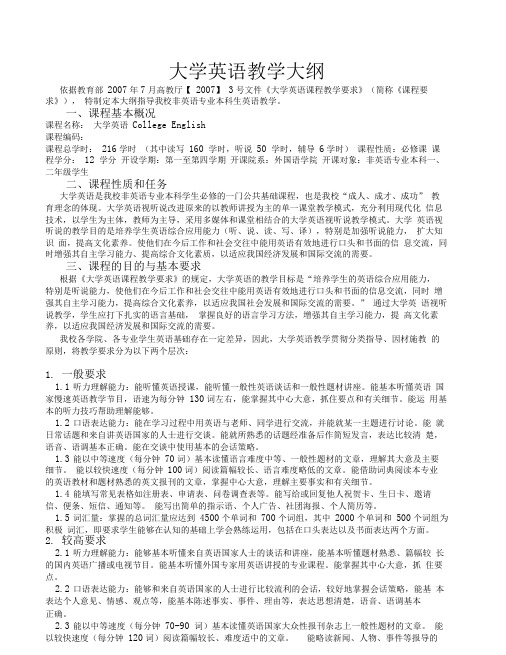
大学英语教学大纲依据教育部2007年7月高教厅【2007】3号文件《大学英语课程教学要求》(简称《课程要求》),特制定本大纲指导我校非英语专业本科生英语教学。
一、课程基本概况课程名称:大学英语College English课程编码:课程总学时:216学时(其中读写160 学时,听说50 学时,辅导6学时)课程性质:必修课课程学分:12 学分开设学期:第一至第四学期开课院系:外国语学院开课对象:非英语专业本科一、二年级学生二、课程性质和任务大学英语是我校非英语专业本科学生必修的一门公共基础课程,也是我校“成人、成才、成功” 教育理念的体现。
大学英语视听说改进原来的以教师讲授为主的单一课堂教学模式,充分利用现代化信息技术,以学生为主体,教师为主导,采用多媒体和课堂相结合的大学英语视听说教学模式。
大学英语视听说的教学目的是培养学生英语综合应用能力(听、说、读、写、译),特别是加强听说能力,扩大知识面,提高文化素养。
使他们在今后工作和社会交往中能用英语有效地进行口头和书面的信息交流,同时增强其自主学习能力、提高综合文化素质,以适应我国经济发展和国际交流的需要。
三、课程的目的与基本要求根据《大学英语课程教学要求》的规定,大学英语的教学目标是“培养学生的英语综合应用能力,特别是听说能力,使他们在今后工作和社会交往中能用英语有效地进行口头和书面的信息交流,同时增强其自主学习能力,提高综合文化素养,以适应我国社会发展和国际交流的需要。
” 通过大学英语视听说教学,学生应打下扎实的语言基础,掌握良好的语言学习方法,增强其自主学习能力,提高文化素养,以适应我国经济发展和国际交流的需要。
我校各学院、各专业学生英语基础存在一定差异,因此,大学英语教学贯彻分类指导、因材施教的原则,将教学要求分为以下两个层次:1. 一般要求1.1听力理解能力:能听懂英语授课,能听懂一般性英语谈话和一般性题材讲座。
能基本听懂英语国家慢速英语教学节目,语速为每分钟130词左右,能掌握其中心大意,抓住要点和有关细节。
新标准大学英语综合教程4教师用书Unit1
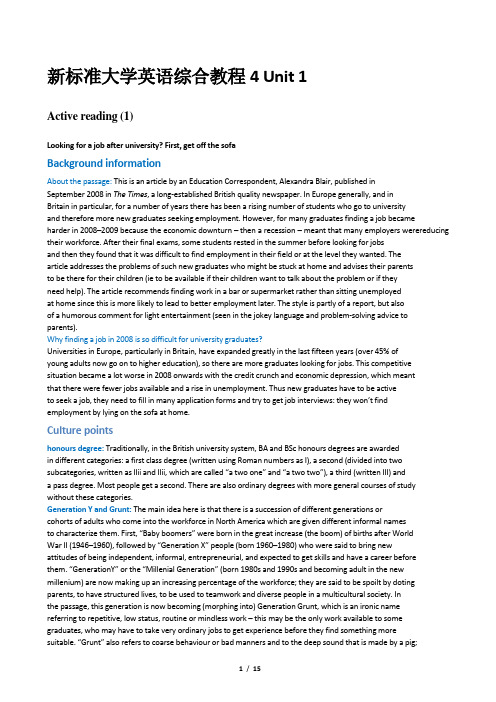
新标准大学英语综合教程4 Unit 1Active reading (1)Looking for a job after university? First, get off the sofaBackground informationAbout the passage: This is an article by an Education Correspondent, Alexandra Blair, published inSeptember 2008 in The Times, a long-established British quality newspaper. In Europe generally, and inBritain in particular, for a number of years there has been a rising number of students who go to universityand therefore more new graduates seeking employment. However, for many graduates finding a job becameharder in 2008–2009 because the economic downturn – then a recession – meant that many employers werereducing their workforce. After their final exams, some students rested in the summer before looking for jobsand then they found that it was difficult to find employment in their field or at the level they wanted. Thearticle addresses the problems of such new graduates who might be stuck at home and advises their parentsto be there for their children (ie to be available if their children want to talk about the problem or if theyneed help). The article recommends finding work in a bar or supermarket rather than sitting unemployedat home since this is more likely to lead to better employment later. The style is partly of a report, but alsoof a humorous comment for light entertainment (seen in the jokey language and problem-solving advice to parents).Why finding a job in 2008 is so difficult for university graduates?Universities in Europe, particularly in Britain, have expanded greatly in the last fifteen years (over 45% ofyoung adults now go on to higher education), so there are more graduates looking for jobs. This competitive situation became a lot worse in 2008 onwards with the credit crunch and economic depression, which meantthat there were fewer jobs available and a rise in unemployment. Thus new graduates have to be activeto seek a job, they need to fill in many application forms and try to get job interviews: they won’t findemployment by lying on the sofa at home.Culture pointshonours degree: Traditionally, in the British university system, BA and BSc honours degrees are awardedin different categories: a first class degree (written using Roman numbers as I), a second (divided into two subcategories, written as IIii and IIii, which are called “a two one” and “a two two”), a third (written III) anda pass degree. Most people get a second. There are also ordinary degrees with more general courses of study without these categories.Generation Y and Grunt: The main idea here is that there is a succession of different generations orcohorts of adults who come into the workforce in North America which are given different informal namesto characterize them. First, “Baby boomers” were born in the great increase (the boom) of birt hs after WorldWar II (1946–1960), followed by “Generation X” people (born 1960–1980) who were said to bring newattitudes of being independent, informal, entrepreneurial, and expected to get skills and have a career before them. “GenerationY” or the “Millenial Generation” (born 1980s and 1990s and becoming adult in the new millenium) are now making up an increasing percentage of the workforce; they are said to be spoilt by doting parents, to have structured lives, to be used to teamwork and diverse people in a multicultural society. Inthe passage, this generation is now becoming (morphing into) Generation Grunt, which is an ironic namereferring to repetitive, low status, routine or mindless work – this may be the only work available to some graduates, who may have to take very ordinary jobs to get experience before they find something moresuitable. “Grunt” also refers to coarse behaviour or bad manners and to the deep sound that is made by a pig;when people “grunt” they express disgust but do not communi cate with words – this may be how the parentsof new graduates think their children communicate with them!A comprehensive refers to a British type of secondary school which became popular in the1960s. Before thatthere were academic “grammar schools” and more general “secondary modern” schools for those who didnot pass the grammar school entrance tests, but the comprehensive schools were designed for all students ina social philosophy of bringing diverse students together whether they were academic or not. Those studentswho went to a comprehensive school probably felt that had to study particularly hard (I worked my backsideoff) to get to university, compared to those who went to grammar schools where all students were academic –comprehensive students felt they had to struggle to get to university.Chicken suit This refers to a large yellow costume that someone wears which makes the person look like agiant chicken. Before he became a famous actor, Brad Pitt once dressed in such a costume when he had a job advertising for a restaurant called El Pollo Loco (The Crazy Chicken’ in Spanish) – the job meant that he hadto walk around the streets like a chicken to attract customers to come to the restaurant.Language points1 Those memories of forking out thousands of pounds a year so that he could eat well and go to theodd party, began to fade. Until now. (Para 1)The parents paid a lot of money for their son’s university fees and living expenses (so that he could eatwell) and for occasional social events – at graduation these memories of money were mostly forgottenbecause the parents were proud. But now the parents are thinking of money again because the son doesn’thave a job and doesn’t seem to be actively seeking one.2 This former scion of Generation Y has morphed overnight into a member of Generation Grunt.(Para 2)The distinguished son of Generation X (of the parents’ generation who worked hard, got jobs, and hadgood careers and expected their son to do the same) has changed into a member of Generation Grunt – hedoesn’t seem to communicate much, lies around and doesn’t get a job (or can only do a low status routingjob).3 I passed the exams, but at the interviews they accused me of being ‘too detached’ and talking inlanguage that was ‘too technocratic’, which I didn’t think possible, but obviously it is. (Para 5)He passed the entrance exams for a government post, but he was criticized in the selection interviews:They said he was detached (not personally involved) and too technocratic (he used the language of atechnical expert or high authority). As a new graduate he probably wanted to show his expertise in hislanguage so he can’t understand this criticism.4 For the rest it is 9-to-5 “chilling” before heading to the pub. (Para 6)The others who do not have a routine low status job (like stacking goods on a supermarket shelf) chill outall day (they spend their time casually relaxing –they don’t look for work) and go to pub for a drink in theevening.5 I went to a comprehensive and I worked my bac kside off to go to a good university …(Para 6)He went to a school for students of all abilities (not to a special school for academic students) and so hehad to work very hard to enter a good university: Your backside means your bottom – the part of yourbody that you sit on – to work your backside off is informal and it means you work very hard indeed.6 … but having worked full-time since leaving school herself, she and her husband find it tricky toadvise him on how to proceed. (Para 7)The mother has always had a full-time job (presumably the father is also working full-time), so she doesnot have relevant personal experience. For her, it is tricky to give advice (difficult to do).7 Carry on life as normal and don’t allow them to abuse your bank accoun t or sap your reserve ofemotional energy. (Para 11)The advice from Gael Lindenfield here is that parents should live as usual. They should neither let theirchildren spend the parents’ money unnecessarily, nor let the problem take away all their energy an demotions. Sap their reserve means use up their store of emotional energy.8 After that the son or daughter needs to be nudged firmly back into the saddle. (Para 12)Then the parents should gently push their children firmly so that they get back into control of their lives. Reading and understanding2 Choose the best answer to the questions.Teaching tipsGo over the correct answers with Ss and ask them to explain why the other answers are wrong (See below).1 Why hasn’t Jack Goodwin got a job yet?(a) He doesn’t have a very good degree.(No, he has a 2:1 which is considered a good degree. )(b) He refuses to apply for jobs with low salaries.(He feels he should get a better job after studying at university.)(c) It isn’t easy to get a job in the current fi nancial climate.(This may be true but the passage does not mention this.)(d) He prefers to stay at home and help his family.(No, he doesn’t seem to be helping his family: he watches TV and talks to friends.)2 How does he spend a typical day?(a) Doing a temporary job.(No, some of his friends are working in temporary jobs but he doesn’t want to do this.)(b) Watching television.(He watches TV a lot.)(c) Queuing up in the university careers service.(No, he went there once but he didn’t want to queue s o he walked away.)(d) Preparing for the next job interview.(No, he doesn’t seem to be preparing for interviews.)3 How do most of his friends spend the day?(a) They do nothing all day and go to the pub in the evening.(All except one of them do nothing except chill, then they go to the pub.)(b) They do outdoor activities such as sailing.(No, none of them seem to do outdoor activities; there is no mention of sailing.)(c) They are forced to work by their parents.(No, only one of them has been forced out to stack shelves by his parents; the others seem to be like Jack.)(d) They do part-time jobs such as working in a bar.(No, the text mentions bar work but none of Jack’s friends seem to do this work.)4 How are Jack’s parents helping him?(a) By looking for jobs for him.(No, Jack has tried to get a job himself; there’s nothing here about his parents helping him look for a job.)(b) By paying for a trip to South America.(No, although he is going on a three-week trip to South America, the passage does not say that Jack’s parents have paid for this.)(c) By gradually making him more financially aware.(The passage does not say so explicitly, but this is the implication about the cut-off point after thetrip when he may be expected to pay rent and contribute to the household bills.)(d) By threatening to throw him out of the house.(No, they haven’t threatened to do this, but they definitely want him to work after he gets back from his trip.)5 What does Gael Lindenfield say about Jack’s parents?(a) They ha ve not really understood Jack’s problems.(No, she doesn’t say this; she says they must balance being positive with not making life too comfortable. This doesn’t mean they haven’t understood Jack’s problems.)(b) They have made life too comfortable for Jack.(No, she says they must balance comfort with being positive. This doesn’t necessarily mean that they have already made life too comfortable for Jack.)(c) The approach they have chosen is the right one.(She says they have struck exactly the right note.)(d) They need help from a psychologist.(No, she doesn’t say this.)6 What do Whoopi Goldberg, Bruce Willis and Brad Pitt have in common?(a) They all did bar work before going to university.(No, we don’t know from the passage if any of them did this.)(b) They took part in protests against nuclear power plants.(No, we don’t know is any of them did this)(c) They learnt to act by dressing up as giant chickens.(No, only Brad Pitt did this.)(d) They all did temporary jobs at one stage in their lives.(This is right, although they all had completely different temporary jobs.)Dealing with unfamiliar words3 Match the words in the box with their definitions.1 to make progress by moving to the next stage in a series of actions or events (proceed)2 the process of changing from one situation, form or state to another (transition)3 not feeling involved with someone or something in a close or emotional way (detached)4 referring to something which will happen soon (upcoming)5 to be sitting still in a position that is not upright (slump)6 to return to a previous state or way of behaving (revert)7 to say what happened (recount)4 Complete the paragraph with the correct form of the words in Activity 3.It isn’t easy to make the (1) transition from a busy university student to an unemployed young adult (2) slumped on a bar stool or half watching a mindless television show, wondering if and how their career is going to (3) proceed. Many people who have experienced a long period of inactivity like this, when (4) recounting how they felt at the time, refer to the same strange psychological effect. As the days pass, they begin to feel (5) detached from any sense of pressure to go and look for a job, and tend to regard (6) upcoming interviews as if they were not very important. Typically, back at home after three or four years away, they (7) revert to old habits, start seeing old friends, and, in many cases, become dependent again on their parents.5 Replace the underlined words with the correct form of the words in the box. You may need to make other changes.1 I went to a mixed-ability secondary school just outside London. (comprehensive)2 I got stopped by a policeman who asked to see my driving licence. (cop)3 Have you seen this beautiful from the air view of Oxford? (aerial)4 Isabel tightly her bag as she walked down the corridor towards the office. (clutched)5 You should speak to Toby; he’s an supporter of flexible working hours. (advocate)6 I hurt my leg badly a couple of months ago, and it still hasn’t got be tter completely. (healed)6 Answer the questions about the words.1 Is a dead-end job one with (a) exciting prospects, or (b) no future?2 Is a tricky problem (a) difficult, or (b) easy to solve?3 If an activity saps all your energy, do you feel (a) tired, or (b) more active than usual?4 Does a pushy person try to (a) persuade you to do something you don’t want to, or (b) help you bylistening to what you have to say?5 If you feel apathy, do you want to (a) change the world, or (b) stay at home and do nothing?7 Answer the questions about the phrases.1 Is fork out (a) a formal, or (b) an informal way of saying to pay for something?2 If you are in the same boat as another person, are you (a) making the same journey together, or (b) in the same difficult or unpleasant situation?3 If you feel you have come full circle, do you (a) feel you are back where you started, or (b) feel a senseof satisfaction because you have completed something?4 If someone takes a soft line, do they deal with a person (a) in a kind and sympathetic way, or (b) in a lazy way without making a decision?5 If you strike the right note about something, are you expressing yourself (a) well, or (b) badly?6 If you do something by all means, do you (a) try your best to do it, or (b) not care about it?7 If you nudge someone back into the saddle, are you encouraging them to (a) take responsibility again, or(b) take it easy?8 If you talk through a problem with someone, do you (a) examine it carefully and sensitively, or (b) refer to it quickly and then change the subject?Reading and interpreting8 Answer the questions.1 “Will he ever get a job?” Who is asking this question? What mood does it express?The parents are asking this because the paragraph is addressed to parents (earlier it sa ys “your graduate son”). The mood seems to express patience or resignation because the word “ever” suggests that gettinga job will take a long time.2 Who describes Generation Y as “rebels without a cause”? Is it a fair description?This is the writer’s d escription to indicate that this generation is rebelling against parents or society,but they have nothing particular to rebel against. This doesn’t seem very fair because the students are trying to find work –it is just that they don’t like their parents nagging them. So they are a bit rebellious against their parents, but no more than that.3 Jack “walked into the university careers service and straight back out again”. What does this suggest about Jack’s character?It suggests that Jack is not very determined. As soon as he saw the queue he left without waiting and without trying to ask about jobs or careers.4 Jack spent the summer “hiding”. Hiding from what? Why are quotation marks used?Probably this means he was hiding from the world of work, staying at home and not looking for a job. The quotation marks tell us that he wasn’t literally hiding, he just spent a lot of time at home.5 How is Mrs Goodwin’s point of view affected by her own personal experience?In one way her experience hasn’t affected he r attitude: She left school and went immediately to a job (without going to university) and has been working full-time since then and yet she is sympathetic and takes a soft line.6 How is Lindenfield’s point of view affected by her own personal experience?Her personal experience was that she worked in a bar before finding her first proper job as an aerial photographic assistant. So she says such work is a great networking opportunity. If new graduates are good at such work and bright, cheerful and polite, they will soon be promoted. Her personal experience thus reflects – or perhaps has created – her point of view.7 What would the first two paragraphs have focused on if they had been presented from the point of view of the students rather than the parents?The first two paragraphs would have focused on the need for the new graduates to rest for a bit after their hard studies. It is OK for students to relax with the TV or to socialize with friends for a while, then they can start a serious search for employment after that.Active reading (2)If you ask meBackground informationThis is an informal and personalized account of an economics graduate who gets a job in a pub for a year and then has an opportunity to be successful (a lucky break). She works in a L ondon pub called “The Salisbury”or “The Marquis Salisbury”, named after someone who was the British Prime Minister three times between 1885 and 1902 and whose family once owned the pub’s land. The 100 year old pub is in Leadenhall Street, just off the Charing Cross Road and Leicester Square. Daytime customers can get a pub lunch and evening customers include many office workers and theatre goers (the pub is near many West End theatres). The interior of this pub is dazzling, with large mirrors, cut glass and a mahogany décor.British pubs are often named after famous people (Robin Hood, The Duke of Wellington) or royalty (The Queen’s Arms, the Prince of Wales) or historical symbols (The Rose and Crown to represent King Edward III, The Royal Oak to represent King Charles II who once hid in a large oak tree). Other names often include colours and animals (The Red Bull, The Black Horse, The Golden Lion, The Swan) or symbols of traditional trades (The Compasses for carpenters, The Three Hammers for blacksmiths, The Three Tuns for winemakers). As the pub is a social place to meet as well as a place to get a drink, people often play games like dominoes or darts or join a quiz or competition. A common expression is to “go down the pub” or “go round to the local” (bot h meaning to go to the local pub).Culture pointspub in London: A pub is a place where people go for a drink and to meet friends and socialize. People can play games – such as darts, cards, dominoes – in a pub and pubs often have quiz nights, with prizes for thewinners, and live music (See also Background information)The Salisbury is a well-known pub in central London (See also Background information)London School of Economics is a distinguished university in central London, famous for social sciences. Language points1 If you ask me, real life is not all it’s cracked up to be. (Para 1)In my opinion (If you ask me introduces an opinion), real life is not everything that people say it is. If athing is cracked up to be, people normally praise it but in the opinion of the speaker they are wrong.2 … spending money when you don’t have any is dead easy. (Para 7)Dead here means very. For example, we can say dead tired (exhausted), a dead loss (a complete loss or useless), a dead weight (very heavy, difficult to lift).3 What were the odds on anyone being so nice? (Para 11)What are the chances that someone would be so nice? The writer is emphasizing here that such kindness is very unusual.4 … looking back after all these years, you only need one or two break s in your life to succeed.(Para 13)A break here means a chance to be successful. A lucky break is an unexpected opportunity.Reading and understanding2 Choose the best answer to the questions.1 What did the writer want to do after finishing her degree?(a) To do an MA at the London School of Economics.(b) To earn some money to pay off her loan.(c) To start working as soon as possible.(d) To return home and help her mother.2 Why did she ask for a job in The Salisbury?(a) She was hungry and thirsty.(b) She thought it would lead to better things.(c) She was a friend of the landlord.(d) She had the idea when she saw the landlord working.3 What did she buy with her first salary?(a) A bunch of flowers.(b) A CD and a plant for the flat she lived in.(c) A ham sandwich and a glass of beer.(d) She didn’t have any money left after paying the bills.4 Why did Tony give her £20,000?(a) He found out it was her birthday and wanted to help.(b) He trusted her and thought it would help her.(c) He wanted her to leave the pub and work for him.(d) He was secretly in love with her.5 What did she do with the money?(a) She used it to pay for her course at the LSE.(b) She lost a lot of it in the 2008 stock market crash.(c) She invested it and paid back Tony and other investors.(d) She used it to start her own business.6 Why was Tony pleased when she repaid the loan?(a) He had had an accident and needed the money for a wheelchair.(b) It meant that he would be able to see her again.(c) It proved that he had been right to invest in her.(d) She paid back the loan with a lot of interest.3 Work in pairs and answer the questions.What do we know about the writer’s:1 family background?Her mother had worked hard for 15 years to support her education but couldn’t afford any further support. Her father wasn’t around most of the time. He didn’t have any money because he spent it on gambling on dog racing or drinking in pubs.2 career as a student?She had a good degree in economics and wanted to study for a masters course at the London School of Economics.3 ambition?She wanted to get a job in finance or investments in London because then she would be able to use her degree.4 appreciation of other people?She appreciated Mike’s friendliness with customers and his s kill, and she appreciated Tony as a nice person; later she appreciated the trust of Tony and his friends5 love life?We don’t know much about this, except that she doesn’t like boys to hassle her. She thinks they are immature.6 financial expertise?It must be quite good: She invested the £20,000 and made enough profit to pay the money back with interest and set up her own company.7 sense of responsibility?She has a strong sense of responsibility because she paid back the money to the investors and paid theman annual interest for the loan.8 philosophy of life?She believes that you should work hard; you may need one or two breaks to succeed but you should know how to use the breaks. You should be honest and responsible with people who trust you.Dealing with unfamiliar words4 Match the words in the box with their definitions.1 funny or entertaining (amusing)2 used for emphasizing that something good has happened, especially because of good luck (fortunately)3 an amount of money that a person, business or country borrows, usually from a bank (loan)4 to take an amount or number from a total (deduct)5 the most exciting, impressive, or interesting part of an event (highlight)6 to show that you understand someone’s problems (sympathize)7 needing a lot of time, ability, and energy (demanding)5 Complete the conversation with the correct form of the words in Activity 4.Teaching tipsWhen Ss have completed the blanks with the correct form of the appropriate words, ask them to practice reading the dialogue, trying to make their reading sound as conversational as possible. Choose a pair to perform their reading to the class. The class listens and gives the performing pair a rating on a scale of 1-10 for fluency and naturalness.A After three years at univers ity, I’m now quite heavily in debt.B I (1) sympathize with you, I know what it’s like to have financial problems. But (2) fortunately I didn’t need to take out a student (3) loan when I was at university, because I had a part-time job.A What did you do?B I worked in a restaurant at weekends.A That must have been very (4) demanding.B Yes, it was. I had to get the right balance between work and study. But the other people who worked there were good fun to be with, so it was quite (5) amusing too. The (6) highlight of the weekend was always Saturday night when we worked overtime.A But I don’t expect you made a lot of money?B No, there wasn’t much after they’d (7) deducted tax and pension contributions. But it was enough to keep me going.6 Replace the underlined words with the correct form of the words in the box. You may need to make other changes.1 When I was at college I kept all my personal things in an old cupboard.2 A lot of people who leave university before getting a degree end up in good jobs.3 I think she’ll get a good degree, but I wouldn’t risk my money on the exact result.4 The money I spent at college was more than what I earned in my part-time job.5 The chances of my being offered a job after that interview must be quite remote.6 Our business has done very well since we changed our advertising.7 I think telling the truth and not cheating is always the best policy.Key: (1) belongings (2) dropouts (3) gamble (4) exceeded (5) odds(6) has thrived (7) honesty7 Answer the questions about the words and expressions.1 If something is not all it’s cracked up to be, is it (a) valid and interesting, or (b) just a little bit disappointing?2 If someone keeps banging on about something, are you likely to be (a) interested in, or (b) bored by what they say?3 If there is a lot of hassle in your life, are you likely to feel (a) stressed, or (b) relaxed?4 If something happens out of the blue, is it (a) unexpected, or (b) part of your plan?5 If you say you ended up in a particular job, do you suggest that (a) you have fulfilled your ambition, or(b) it happened almost by chance?6 Are the regulars in a pub (a) the customers who come very often, or (b) the food the pub offers mostoften?7 If something is dead easy, is it (a) very easy, or (b) not easy at all?8 If you treat someone to something, do you (a) buy something nice for them, or (b) behave badly tothem?9 If you cheer a place up, do you (a) make the place look brighter, or (b) make the people in the placehappier?Reading and interpreting8 Look at the sentences from the passage and identify the style features.1 Twelve years at school and three years at university, teachers banging on about opportunities in the bigwide world beyond our sheltered life as students, and what do I find?This shows the informality of an incomplete sentence in the first part, the use of an informal expression(banging on) and a rhetorical question to the reader (What do I find?)2 Try as I might to stay cheerful, all I ever get is hassle, sometimes with people (especially boys, god,when will they grow up?) …This has the use of an informal word (hassle), an informal exclamation (god) and a question to thereader (When will they grow up?)3 Actually, I had my eye on the course at the London School of Economics (LSE).Here there is a discourse marker typical of speech (Actually) and an informal phrase (had my eye on).4 I kind of understand it, and not just because my degree is in economics.Here “kind of” is a sort of discourse marker of informal speech (showing som ething is general, vague ornot definite).5 I wanted something in finance and investments, because you know, maybe with a job like that, I coulduse my degree.This has a discourse marker of informal speech (you know).6 ... it’s true, he really did seem to have three hands.Again here is a discourse marker of informal speech (it’s true).7 I talked to him about ... well, about pretty well everything …This has another discourse marker of informal speech (well) and an informal phrase (pretty well).9 Answer the questions.1 What is the focus of each section of the story?• The first part is the background before the story really begins. It focuses on the writer’s financialproblems after graduation and on her need to work since her family cannot support her.• The second part focuses on nice people who help the writer, mainly on Mike who gives her a job in apub.• In the third part, the focus is on the writer’s sad feelings on her birthday and how she tells Tony hertroubles. He talks to some friends and gets her a £20,000 loan to set up a business.• In the fourth part, the writer is looking back some years later. She has her masters degree and has a jobin an investment bank and has used the loan to set up her own company. The focus is on the twist inthe story, where the situation is reversed: Tony is disabled after an accident and needs the repaymentof the loan to adapt his house for his disability.• The last two main sentences are also introduced by “If you ask me,” This is a coda (a finishing phraseor two) about investing in people.2 How does the time context change from one section to the next?The first section gives the background before the writer finds a job, in the past before the time of thestory. The second section is in the past, showing how she ot a job. The third section, still in the past,shows the particular event of how she got a lucky break through Tony’s help. In the fourth section, thetime is in the present, with the writer looking back after some years. She tells us what happened and her。
高校教学用书选用的标准与要求
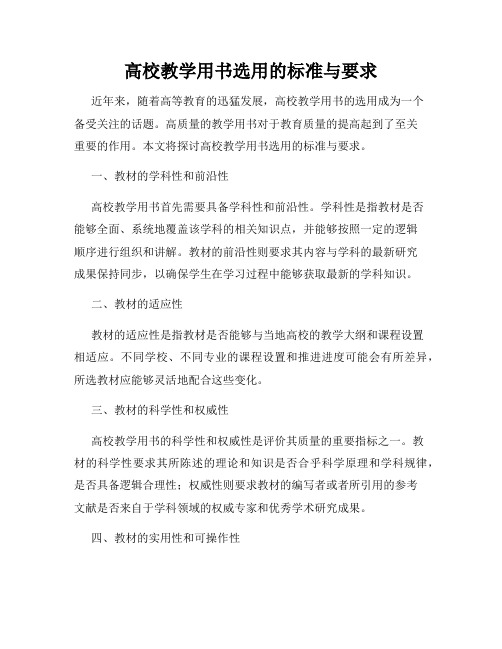
高校教学用书选用的标准与要求近年来,随着高等教育的迅猛发展,高校教学用书的选用成为一个备受关注的话题。
高质量的教学用书对于教育质量的提高起到了至关重要的作用。
本文将探讨高校教学用书选用的标准与要求。
一、教材的学科性和前沿性高校教学用书首先需要具备学科性和前沿性。
学科性是指教材是否能够全面、系统地覆盖该学科的相关知识点,并能够按照一定的逻辑顺序进行组织和讲解。
教材的前沿性则要求其内容与学科的最新研究成果保持同步,以确保学生在学习过程中能够获取最新的学科知识。
二、教材的适应性教材的适应性是指教材是否能够与当地高校的教学大纲和课程设置相适应。
不同学校、不同专业的课程设置和推进进度可能会有所差异,所选教材应能够灵活地配合这些变化。
三、教材的科学性和权威性高校教学用书的科学性和权威性是评价其质量的重要指标之一。
教材的科学性要求其所陈述的理论和知识是否合乎科学原理和学科规律,是否具备逻辑合理性;权威性则要求教材的编写者或者所引用的参考文献是否来自于学科领域的权威专家和优秀学术研究成果。
四、教材的实用性和可操作性教材的实用性和可操作性是衡量教材是否适用于高等教育教学的重要标准。
实用性要求教材的内容具备一定的实际应用性,能够帮助学生理解和掌握学科知识;可操作性则要求教材在练习、实验等方面具备一定的可操作性,让学生能够通过实践来提高自己的学科能力。
五、教材的语言表达和排版设计教材的语言表达和排版设计是影响学生阅读体验的重要因素。
语言表达要求教材的文字准确、简明,避免使用过于繁琐或生涩难懂的描述方式;排版设计要求教材的版面整洁美观,图文并茂,清晰易读。
六、教材的价格和版权问题教材的价格和版权问题也是高校教学用书选用的重要考虑因素。
教材的价格应该合理,考虑到学生的经济承受能力;版权问题要求教材作者和出版社具备合法的版权,以确保教材的合法使用。
综上所述,高校教学用书选用的标准与要求涵盖了教材的学科性和前沿性、适应性、科学性和权威性、实用性和可操作性、语言表达和排版设计以及价格和版权问题等方面。
义务教育教师用书(1—9年级).doc
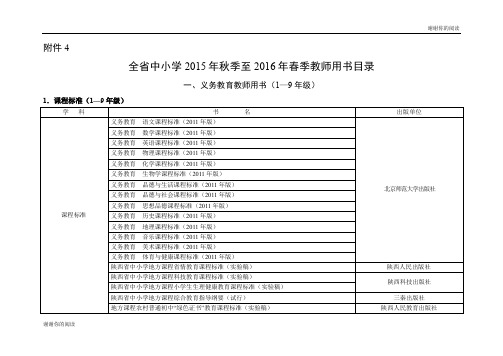
英语课程标准研修
2004.07
物理课程标准研修
2004.07
学科教学论部分
化学课程标准研修
2004.06
高等教育出版社
生物课程标准研修
2004.05
历史课程标准研修
2004.05
地理课程标准研修
2004.06
音乐课程标准研修
2004.06
美术课程标准研修
2004.07
体育与健康课程标准研修
第二套全国中小学生(幼儿)系列广播体操
中学生广播体操
音带1盒
VCD 1张
高中
陕西师范大学出版社
5.教学挂图、电子音像(7—9年级)
学科
书名
册次(数量)
使用时间
出版单位
音乐
音乐挂谱简谱
13册至18册
七年级上学期至
九年级下学期
人民音乐出版社
音乐挂谱线谱
13册至18册
七年级上学期至
九年级下学期
体育与健康
第二套全国中小学生(幼儿)系列广播体操挂图
时代在召唤
七年级至九年级
人民教育出版社
研究性学习
高中研究型课程实施案例选编
高中一至三年级
上海科技教育出版社
高中研究型课程导师指导手册
高中一至三年级
陕西省农村中小学现代远程教育工程管理与技术手册
全一册
陕西人民教育出版社
3.普通高中新课程研修手册
学科
书名
出版时间
出版单位
通识研修部分
新课程的理念与创新
2004.04
高等教育出版社
新课程的领导、组织与推进
2004.03
学校课程方案的形成与学生选课指导
义务教育教师用书(1—9年级).doc
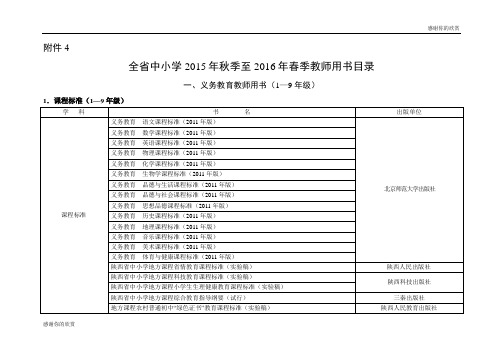
学校课程方案的形成与学生选课指导
2004.03
校本教研与教师专业发展
2004.07
新课程的教学实施
2004.03
课程资源的开发与利用
2004.03
新课程与学生评价改革
2004.03
综合实践活动的实施与管理
2004.03
学科教学论部分
语文课程标准研修
2004.07
高等教育出版社
数学课程标准研修
刘恩山
2007.01
普通高中新课程教学研究与案例丛书:信息技术教学研究与案例
李艺
2007.01
普通高中新课程教学研究与案例丛书:通用技术教学研究与案例
顾建军
2007.05
5.教学挂图、电子音像
学科
书名
册次(数量)
使用时间
出版单位
体育与
健康
第二套全国中小学生(幼儿)系列广播体操挂图
青春活力
高中
人民教育出版社出版
义务教育课程标准实验教师用书(水平二)
三至四年级全一册
三年级至四年级
义务教育课程标准实验教师用书(水平三)
五至六年级全一册
五年级至六年级
体育与健康教师用书(供农村学校教师使用)
第1-6册
一年级至六年级
科学出版社
第二套全国中小学生(幼儿)系列广播体操教师参考书
全一册
小学
人民教育出版社
《学生体质健康标准(试行方案)》解读
研究性学习
高中研究型课程实施案例选编
高中一至三年级
上海科技教育出版社
高中研究型课程导师指导手册
高中一至三年级
陕西省农村中小学现代远程教育工程管理与技术手册
人教版新课标三年级数学上册教师用书

人民教育出版社、课程教材研究所小学数学课程教材研究开发中心编写的《义务教育课程标准实验教科书数学》三年级上册,是以《全日制义务教育数学课程标准(实验稿)》(以下简称《标准》)的基本理念和所规定的教学内容为依据,在总结现行九年义务教育小学数学教材研究和使用经验的基础上编写的。
编者一方面努力体现新的教材观、教学观和学习观,同时注意所采用措施的可行性,使实验教材具有创新、实用、开放的特点。
另一方面注意处理好继承与发展的关系,既注意反映数学教育的新理念,又注意保持我国数学教育的优良传统,使教材具有基础性、丰富性和发展性。
下面就这册教材中几个主要问题作一简要说明,以供教师参考。
这一册教材包括下面一些内容:万以内的加法和减法笔算,有余数的除法,多位数乘一位数,分数的初步认识,四边形,千米和吨的认识,时、分、秒,可能性,数学广角和数学实践活动等。
万以内的加法和减法笔算、多位数乘一位数以及四边形是本册教材的重点教学内容。
在数与计算方面,这一册教材安排了万以内的加法和减法笔算、多位数乘一位数、有余数的除法以及分数的初步认识。
万以内的加法和减法笔算是小学生应该掌握和形成的基础知识和基本技能,也是进一步学习多位数笔算乘、除法的基础。
例如,两位数的乘法中要把两个部分积加起来,实际是计算三、四位数的加法,两位数除法中每次试商后通常要做三位数减法。
同样,多位数乘一位数也是学习两、三位数乘法的基础,因为不论因数是几位数,在计算过程中都要分解成用几个多位数乘一位数。
有余数的除法是表内除法学习的继续,也是学习多位数除法的基础。
分数的初步认识是数概念教学的一次扩展,学生理解掌握会有一定的难度,所以本册出现的内容是最初步的,结合学生的生活实际和具体实例使学生理解一些简单分数的具体含义,给学生建立分数的初步概念,初步学会用简单的分数进行表达和交流,进一步发展数感,并为学习小数和进一步学习分数做好铺垫。
在空间与图形方面,这一册教材安排了四边形一单元,这是教材的另一个重点内容。
新标准大学英语第二版

新标准大学英语第二版
首先,本教材在听力方面注重培养学生的听力技能,通过大量的听力材料,帮助学生提高听力理解能力。
同时,教材还提供了丰富多样的听力练习,让学生在听力训练中不断提高。
其次,在口语方面,本教材注重培养学生的口语表达能力。
通过各种实用的口语练习,帮助学生掌握日常交流所需的语言技能,提高口语流利度和表达能力。
在阅读方面,本教材提供了大量的阅读材料,涵盖了各种不同主题和体裁的文章,帮助学生扩大词汇量,提高阅读理解能力。
同时,教材还注重培养学生的阅读技巧,引导他们学会快速获取信息,提高阅读效率。
最后,在写作方面,本教材通过各种写作练习,帮助学生提高写作能力,培养他们的逻辑思维和表达能力。
教材还提供了大量的写作范例和指导,让学生了解写作的基本要求和技巧,帮助他们写出规范、流畅的英文文章。
总的来说,新标准大学英语第二版是一本全面、系统的英语教材,它不仅注重学生语言知识的学习,更注重培养学生的语言运用能力。
通过本教材的学习,学生可以全面提高英语水平,为将来的学习和工作打下坚实的语言基础。
教师用书清单

序号书名1苏霍姆林斯基《给教师的建议》2做一个专业的班主任3班主任最需要的心理学4教师最需要的心理学5给年轻班主任的建议6优秀班主任60个管理创意7班主任兵法8班主任如何说话9班主任工作的30个典型案例(小学篇)10班主任工作的30个典型案例(中学篇)11班主任文化建班100篇千字妙文12走进生命的教育:教练型班主任专业修炼13治班有道--班主任智慧手册14优秀班主任教育艺术66例15轻松高效做好班主任工作16班级管理实战指南17今天,我们怎样做班主任`优秀班主任成长之路18今天,我们怎样做班主任(中等职业学校卷)19班主任心理辅导实务(小学版)20班主任专业成长——100个千字妙招21做一个智慧型班主任22班主任心理辅导实务(中学版)23课堂观察:走向专业的听评课24课堂密码(第二版)25教学理论:课堂教学的原理、策略与研究26作文课,我们有办法:4位小学语文名师的作文教学智慧27读懂课堂28高效课堂八讲29听王崧舟老师评课30课堂观察Ⅱ:走向专业的听评课31积极学习:101种有效教学策略32吴正宪给小学数学教师的建议33教学设计原理(第五版)34教师的挑战:宁静的课堂革命35听王荣生教授评课36慕课与翻转课堂导论37高效课堂:备课、上课、说课、听课、评课38心智、脑与教育:教育神经科学对课堂教学的启示39吴正宪课堂教学策略40有效教学十讲41聪明教学7原理:基于学习科学的教学策略42课堂教学方法·实践篇43初中主题教育36课44 可以这样教数学 16个小学数学名师的教学智慧45魅力课堂:高效与有趣的教学46数学活动这样做47怎样上课才最棒:优质课堂教学的十项特征48名师怎样观察课堂(小学语文卷)49课堂观察LICC模式:课例集50听李镇西老师讲课51有效课堂提问的22条策略52生物学课堂教学技能训练(含光盘)53英语课堂教学技能训练54大规模开放:慕课怎样改变了世界55基础教育慕课与翻转课堂56小学语文名师古诗文课堂实录57微课程设计与制作教程58课堂深处的精彩中外教育对比赏析59语文课堂教学技能训练60地理课堂教学技能训练61数学课堂教学技能训练/配教学视频VCD62教师课堂研究指南63数学课堂教学反思64化学课堂教学技能训练(附光盘)65回到童画66课堂准备的99个小贴士67西方教育前沿系列丛书(全5册)68图画书创意教学实践69可见的学习(教师版)70美国中小学课堂观察——一位教育学教授的笔记71后现代课程观72课例研究,我们一起来:中小学教师指南(第二版)73给教师的建议(全一册)修订版 20世纪苏联教育经典译丛74作业设计 基于学生心理机制的学习反馈75创新班会课丛书 创新班会课 小学卷76探究式学习——学生知识的自学建构/现代课程与教学研究新视野文库77教学论与生活/20世纪苏联教育经典译丛78教育的现象学研究手册79艺术教育--基础教育新概念80静悄悄的革命:课堂改变,学校就会改变81图解《说文解字》:画说汉字82图解“说文解字”画说汉字(小学版)1~2年级83图解“说文解字”画说汉字(小学版)3~4年级84图解“说文解字”画说汉字(小学版)5~6年级85汉字树(1-6册)礼品套装86体育师友87现代中小学体育88优秀班主任的管理之道89田径教学90打造儿童阅读环境9192939596 97 98 99 100 101 102 103 104 105 106 107 108 109 110 111 112 113 114 115 116 117 118 119 120 121 122 123 124 125 126 127 128 129 130 131 132 133 134 135 136137139140141142143 144 145 146 147 148 149 150 151 152 153 154 155 156 157 158 159 160 161 162 163 164 165 166 167 168 169 170 171 172 173 174 175 176 177 178 179 180 181182183184185186187188189190191我的作文教学故事192我的作文教学主张193教育与幸福生活194一沙一世界 手把手教你箱庭疗法195沙盘游戏中的治愈与转化:创造过程的呈现196小学英语教学关键问题指导197小学英语教学活动设计案例精选198思维导图199思维导图实践版200思维导图系列(套装5册)201东尼·博赞思维导图系列--快速阅读202启动大脑203博赞学习技巧204中学生思维导图学习法205如何高效学习:1年完成麻省理工4年33门课程的整体性学习法206学会提问207批判性思维208思考的艺术209专注力:化繁为简的惊人力量210批判性思维工具211逻辑思维简易入门212如何高效阅读213小学思维训练:思维导图214小学思维训练:八大思维图示法215小学思维训练从书:概念构图216小学思维训练从书:批判性思维217中学思维训练丛书:思维可视化218学习、创造与使用知识 概念图促进企业和学校的学习变革219思维导图背古诗:小学生必背古诗词75+80首220画出你的答案:用思维导图理清思路、解决问题、达成目标221222223224225226227出版社价格教育科学出版社30华东师范大学出版社23南京大学出版社23南京大学出版社22华东师范大学出版社21华东师范大学出版社27华东师范大学出版社30华东师范大学出版社27华东师范大学出版社28华东师范大学出版社22华东师范大学出版社23华东师范大学出版社22华东师范大学出版社27华东师范大学出版社25华东师范大学出版社25华东师范大学出版社30华东师范大学出版社27华东师范大学出版社25华东师范大学出版社26华东师范大学出版社27华东师范大学出版社30华东师范大学出版社30华东师范大学出版社30华东师范大学出版社30华东师范大学出版社30华东师范大学出版社30华东师范大学出版社30华东师范大学出版社30华东师范大学出版社30华东师范大学出版社30华东师范大学出版社30华东师范大学出版社30华东师范大学出版社30华东师范大学出版社30华东师范大学出版社30华东师范大学出版社30华东师范大学出版社30华东师范大学出版社30华东师范大学出版社30华东师范大学出版社30华东师范大学出版社30华东师范大学出版社30华东师范大学出版社30华东师范大学出版社30华东师范大学出版社30华东师范大学出版社30华东师范大学出版社30华东师范大学出版社30华东师范大学出版社30华东师范大学出版社30华东师范大学出版社30华东师范大学出版社30华东师范大学出版社30华东师范大学出版社30华东师范大学出版社30华东师范大学出版社30华东师范大学出版社30华东师范大学出版社30华东师范大学出版社30华东师范大学出版社30华东师范大学出版社30华东师范大学出版社30华东师范大学出版社30华东师范大学出版社30华东师范大学出版社30华东师范大学出版社30华东师范大学出版社30教育科学出版社35教育科学出版社35教育科学出版社35教育科学出版社35教育科学出版社35教育科学出版社35教育科学出版社35教育科学出版社35教育科学出版社35教育科学出版社35教育科学出版社35教育科学出版社35教育科学出版社35陕西师范大学出版社25时代文艺出版社38时代文艺出版社38时代文艺出版社38中国商业出版社145广东省广州市出版50吉林省长春市出版40时代出版传媒29高等教育出版社24北京联合出版公司30中国人民大学出版社出版教育科学出版社北京大学出版社化学工业出版社化学工业出版社40化学工业出版社136化学工业出版社33化学工业出版社30。
